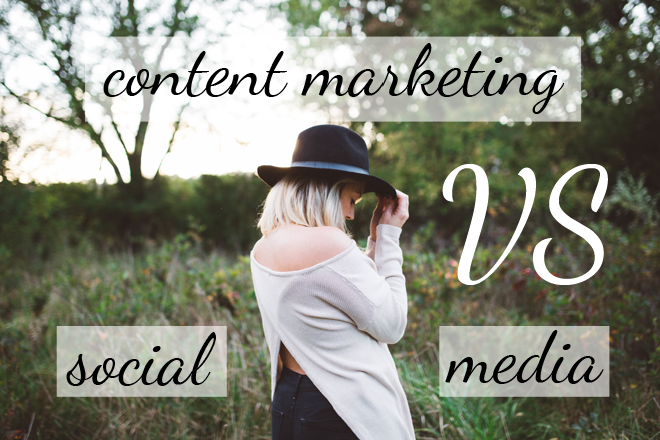Content Marketing vs Social Media
One of the things I find myself discussing again and again - with clients, friends, colleagues, and people who are genuinely confused about what I do, is the difference between "content marketing" and "social media."
Usually when I tell people I do content marketing and social media they respond with something like "oh, you just publish stuff on Twitter, right?" which is really only a small sliver of the equation.
While content marketing heavily involved social media, there's much more to creating content than just pushing it out across a variety of social channels. Even though there's a lot of overlap they are, in fact, two very distinct things, each with different goals, strategies, and processes.
So, once and for all, let's clear the air!

The Sun and the Solar System
Social media marketing is the focus of your marketing activity which is located on social networks.
When marketers share content on social networks like Facebook, Twitter and Pinterest, they're operating within the specific confines of those networks. Sure, they're sharing their own content in a lot of cases, but it's on someone else's network, and none of those networks connect to each other all that often (eg: you don't share Tweets on Facebook, and vice-versa.)
Conversely, the centre of every content marketing strategy is the organization's website.
A business' website is designed to be the central place for all of their branded content. Once the content has been published on the central website, it gets shared across the various social networks where the company has a presence. So, "social media" is the act of using specific social networks, and "content marketing" is creating content on your own website to be published and distributed.
The way that I like to describe this process is the "Sun and Solar System." In this example, your brand website is the 'Sun' - the focal point in all of your marketing efforts, and the brightest and most important star in the sky. The other social networks that you use to distribute the content are 'planets' which orbit around the central hub. Like planets in real-life, the 'planets' in this example operate independently of each other, all have unique features, and have one thing in common: they exist because of the 'Sun'.
Types of Content
Social media marketing is designed to fit within the confines of that social network. For example, a Tweet on Twitter needs to be 140 characters or less, Pinterest pins need to have eye-catching photos, etc.
Content marketing, on the other hand, can come in a variety of styles, flavours, and lengths because websites allow for much more creative and extended types of content. On a website brands can publish blog posts, videos, infographics, white papers and eBooks... the sky's the limit, really.
This flexibility in content means that brands can exercise a higher level of creativity in the content they create on their website, because they don't have to worry about falling within a 140 character limit.
Goals
While content marketing and social media marketing are used in tandem to reach specific goals, they actually are designed to achieve two different things:
Content marketing is focused completely on the 'Sun', which allows it to focus more on demand generation and content publishing than on getting the word out about it.
As a brand publishes content on their website, the 'Sun' in the middle of their solar system, they can use social media to direct traffic back to it, developing a relationship with their audience.
Social media is used to promote brand awareness. When a visitor lands on a brand's website, the brand has full control over what kind of experience that visitor is going to have, and they already have the advantage because the potential customer has already indicated interest by going there in the first place.
Because social networks can't be controlled by brands and businesses, the purpose of those networks then becomes to use them as a means to generate discussion and interact with their audience. Additionally, because social networks are mostly democratic (I say 'mostly' because of the recent introduction of YouTube Red) and all user account are created equally, social networks become a place for brands to have informal interactions with their audience.
Social networks also notify you when someone is talking about you, which makes tracking customer mentions, feedback, and criticism a lot easier to track than ever before.
Why Content Marketing?
Content marketing and social media go hand-in-hand, but many people I talk to focus only on the social media side of things because seeing a brand's presence across multiple social networks gives the impression that it's more important.
This is not true, and I'd actually argue that content marketing actually the more important of the two.
That's because in order for your social media feeds to have a way to genuinely connect with your audience, there has to be a central 'hub' (or Sun) at the centre of things to drive brand awareness and help craft a story. You can't tell your audience about who you are if you don't create the kind of content that helps them understand and care, and social networks just aren't as efficient at doing it because you have to play by the rules of each specific network.
This is why content marketing and social media marketing, though two different things with different purposes, are actually intricately linked.
Did this explanation make sense? What do you think about the difference between content marketing and social media? Tell me in the comments!
